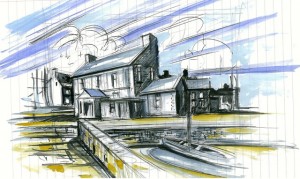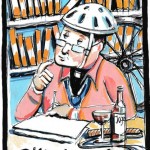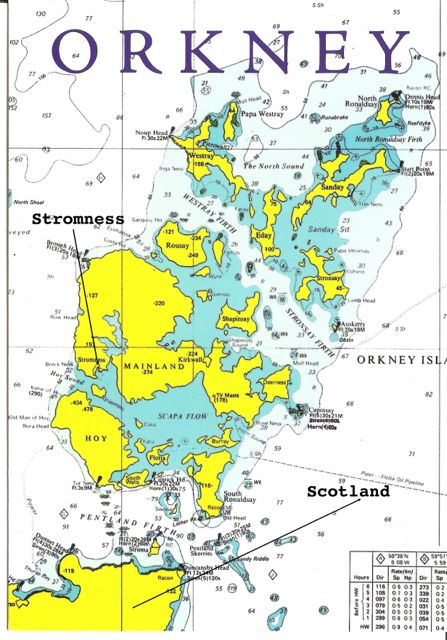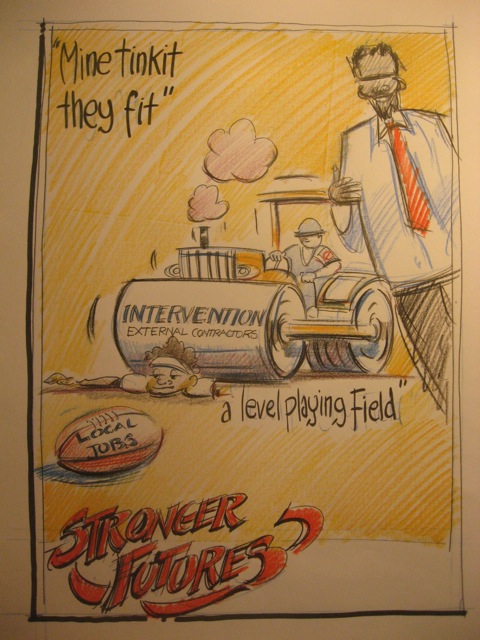Read ‘Reassurance’
by Paddy 0′Cearmada 30 August 2013 in the Election 2013 tab
‘……in an age of narcissism this narcissist goes too far.’
Monthly Archives: August 2013
A letter to the Stromness Museum
 Quentin Cockburn recently visited the Museum at Stromness, Orkney, North of Scotland, (see map below). He was impressed.
Quentin Cockburn recently visited the Museum at Stromness, Orkney, North of Scotland, (see map below). He was impressed.
Dear Stromness Museum,
I love you.
I write to you to encourage your excellent work in maintaining the intrinsic wonder, the exploration and child-like rapture your museum presents to us. I am jaded by the certainty of most museums these days.
As a youth I spent countless days wandering through the archives and displays at the Melbourne Museum. (Now re-located and re-named the Museum of Victoria). It used to be in the heart of the city, it shared its site with the State Library. As a student entombed within the reading room of the state library, I would wander into the museum to find an engaging diversion from the piles of primary sources, the encyclopaedic hansards, and cleanse myself from the biblical certainty espoused by our celebrated historians. It seemed apt, a museum and a library together. One with the voices distilled in time, speaking from the void, the other, artifacts, other stories, described in the touch the feel, the smell, the grittiness of displays, some in cases, others in shelves, to be grasped and examined. And through it all this sense that the bison tusks, the giant crabs, and the maxim gun mountings from HMVS Cerberus told us about ourselves. The museum had the capacity in its crusty wood paneled and bare concrete interior to describe real life, and inject imagination, for those prepared to just contemplate, of other worlds, and the challenge to find, to seek to discover.
I think also that museums can be counter cultural, almost subversive. They speak of indulgence in the ancient and educational as fulfilling and rewarding before endless shopping filled that niche.
The Melbourne Museum was a very Victorian institution in Victoria, Her Majesty’s most important “white” colony.
It embraced a colonial view of things. The objects were all neatly inscribed, and the museum itself suggested, (I think the dioramas had something to do with this), that native Australians, their animals and landscape were to be improved and civilised. It was a sort of covert social darwinism that made it captivating. Imagine a diorama, with an aboriginal tribe suitably in possum skins, the ladies demurely clad, a volcano in the background, a few Diprotodons, and the odd macropod, the message, ‘Ancient man, being ancient’, and possibly as the next case revealed, endangered or extinct. As a group, we Victorians run a close second to our brothers the Tasmanians with a proud tradition of extinction. The museum, in the nicest possible way, made it entertaining. Rather like the statues that adorned the Crystal Palace, the primitive dinosaur prototypes tell us about Victorian romanticism and stuff.
Over a decade ago the Melbourne museum was “relocated”. What was once intrinsic and personal was standardised. The minutiae was taken away, the ships models hived off to the immigration museum, the non standardised stuff, (like stuff from HMVS Cerberus) lost, and the dioramas, destroyed. It’s a very ‘nice’ building, the architects, (who are now engaged on the new visitors centre at Stonehenge) built a very big space with one of their signature ‘Blades’. There are no longer drawers to pull out and the certainty of no un-anticipated discoveries. You see it’s INTERACTIVE!.
And every year they have a new ‘Blockbuster!’. Last year it was Pompeii, the year before the Titanic, this year shall be James Bond. I think they like that, there’s noting really challenging, but it is a very satisfying day and, I’ve been told, a relatively small investment to experience an exhibition schedule that’s Worlds Best Standard.
Of course I’m being facetious, and the reason why is simple. You, at Stromness, possess a magnificent museum. You have a magnificent collection intrinsic to the Orkneys, and Scapa Flow. You endow us, the public, with Nobility, you treat us with respect. You have not bowdlerised your collection to suit some ‘fly-by tourism consultant power point assessment of core values and market research’. You have stayed true to the first principle of humanity and ‘let the objects speak for themselves’. And you have not been deluded by the insecure assumption that ‘Big’ makes the exhibition and experience ‘Valid’, whatever that means.
You have inspired me to do something that other museums do not.
You have inspired me to return.
Thankyou so much, and as an aside, I loved the Kirkwall Wireless museum for the same reason.
A Letter from America
A Letter from America: Politics and Southern Hospitality
by Quentin Cockburn
Since arriving in the U.S, the Leafy, socialist inspired Streets of Chapel Hill, I am reminded of Alistair Cooks ‘Letters from America’.* I used to enjoy listening, (he never spoke quickly) his measured accounts of some obscure facet of American politics, or an equally obscure tangential reference to someone, (a putative Wolf T Flywheel Democrat Senator for Flat Back Idaho), and from this briefest of biographical references craft a stimulating and inspiring window for us to gain an insight into what makes America tick. I wondered if he was ever broadcast in America? Or would that be regarded as a sort of apostasy of the soul, a voice too near to be given the weight of distance, perspective, detachment and hence reason. I also wondered, as he’d been in America since 1937 what perspective, objectivity he could bring after almost sixty years?
So please, as a ‘clean skin’, grant me leave to give a ‘Letter from America’, and in doing so (bear with me), I think I may draw a half light upon a non problem.
The first two days of our visit Cecil and I went to dinner with locals, firstly with a young couple, in which, around a deck, we admired the “openness” between houses and huge trees as part of the garden experience. The absence of fence-lines, almost ordained as preserving an ‘open-ness’ within the community. There seemed to be a lot of waving to neighbours, and episodic references to the ‘so ad so’s’ a few doors down as if they really mattered. As an outsider we offered to bring grog, help wash the dishes, pick up the plates, all courteously but emphatically rejected.
The next evening presented a dinner at an older couples’ home. The conversation over local delicacies (jalapeño poppers, a capsicum derived package of infinite complexity) and a superbly cooked steak enticed your correspondents to gauge some insight into the work we were researching – the voyage of the CSS Shenandoah. We both knew that this was code more or less for politics; the Shenandoah story, all 150 years ago of it, would provide the appropriate segway.
We opened the batting with talk of Australian politics; that interlude was exceedingly brief. The Queen as a respected and universally admired international figure, then as a consequence ensued a mirth filled reference to our future monarch Charles III, and the potential for the United States to re-join the Commonwealth. From this we enquired about the legacy of the Confederate cause. From our hostess came the belief, though qualified by “what we know now” the conviction that after all was said and done, “We, as Southerners, behaved with honour, as ‘gentlemen’, though our cause was flawed”.
Whilst we mused over similarities between the Confederates and the ‘Round-Heads and Cavaliers’, (one flamboyant and elegantly preserving the code of chivalry, the other puritanical and hence mean spirited and petty) we arrived at a comparison, past and present of Prime Ministers and Presidents. There ensued a discussion of long serving politicians, vested interests and lobbyists, Two terms, our host proclaimed, not long enough to be tainted, long enough to establish the important things.
It was then, amidst much laughter that our host delivered his hand grenade.
To the question of who, in our hosts’ lifetime, was the biggest ‘game changer’, most influential. He looked at us, paused and then pronounced more flatly than a dead cat, “Richard Nixon.”
Stunned silence.
He solemnly looked about, “Richard Nixon took away our faith in the political system, that was the game changer. He took our trust, our faith in the system away. And that trust,” he sadly intoned, “has never returned”.
*The first American Letter was broadcast on 24 March 1946 (Cooke said this was at the request of Lindsey Wellington, the BBC’s New York Controller); the series was initially commissioned for only 13 instalments. The series came to an end 58 years (2,869 instalments) later, in March 2004. Along the way, it picked up a new name (changing from American Letter to Letter from America in 1950) and an enormous audience, being broadcast not only in Britain and in many other Commonwealth countries, but throughout the world by the BBC World Service. (from Wikipedia)
Election 2013
 Read Blessed are the peacemakers
Read Blessed are the peacemakers
by Paddy 0′Cearmada 28 August 2013 in the Election 2013 tab
‘In a rare moment of modesty Kevin Rudd mused aloud on radio…..’
On Entering the United States
Entering the United States
By Quentin Cockburn
It was a nine hour flight from London to RDU, the airport for North Carolina’s capital city Raleigh. I’d been told watch out at Customs, and “don’t go in smiling, they don’t like humour”.
I approached Customs and joined the comparatively short ‘Visitors’ queue which a lone customs officer was laboriously processing. The much longer US Citizens queue had a number of processing officers and they seemed to be flying through. An individual I’d chatted to on the plane, came forward and asked me, “do you mind if I jump the queue, I’ve got to be on a flight to new York, in fifteen minutes”.
“No, I don’t mind,” and felt happy to give him a hand. Largesse would be an offset to premonition. I watched as they did the fingerprints, iris test, and passport, there was a brief discussion. I saw him wander off downstairs thinking he’d better get a hurry on.
My turn came, the uniformed officer in the booth, with leather gloves asked “How long are you staying here?”
“A couple of weeks.”
He looked at me and leafed through the passport. It’s the Kafkian in me that makes me blush, deep within my unresolved subconscious; am I a murderer, a pedophile, a rapist?
“Have you ever been to the United States before. What is your next destination?”
I shuffled through the papers kindly prepared by my travel agent. “Departing Chicago on the 19th, then back to the UK for a stopover then onwards.” I smiled, and observed as he read my “blue immigration card”.
“Why haven’t you filled in the residential address?”
Unaware of the importance I replied, “I know whom I’m staying with, and I know he lives in Chapel Hill but I’m being picked up.”
His reply, incredulous, “You don’t know where you are staying?”,
“Chapel Hill!” I enthusiastically replied.
“But where?”
“At Sam and Amy’s.” I leaned forward, for emphasis, “my friend, Sam’s Dad is picking me up.”
He drew a line across the card, and cooly said, “I am holding your passport, report to a customs officer downstairs. When you’ve picked up you luggage chat to the officer at the gate he will instruct you”.
I picked up the baggage, walked over to the gate. “The Officer upstairs instructed me to see you”.
This large man led me to a small room, where upon a simple plastic seat sat my queue jumping friend, (he’d missed the plane), along with another individual from Kenya. He advised me, “Man, it’s all a power trip, just be humble and do what they say”
Next the big bloke walked back in, I started feeling intimidated, could’ve been the black uniform, the handcuffs, gun, all those badges. “So sir you have no idea what the address is?’’
My reply, almost pleading, “Well, I know where they live.”
“Yes Sir, but you should have an address.”
“I know I’ll contact him on my phone.” and I picked the phone up,
“Don’t use that phone”!!
More than slightly flummoxed I said, “My friend is waiting for me on the other side.” Oh God, the phrase had already acquired a sinister meaning.
He said quite stiffly, “Would you go to Australia and get off at a airport without knowing where you are going?”
I equivocated, “Well I would. I’d go to Bendigo for example, ring him or work out from locals here he’d live.” Then with emphasis, moving slightly closer, I added, “You see I’ve known this bloke for years.”
“Don’t stand close to me sir!” He was almost threatening.
I continued, “It’s his son Sam, he’s a local, lives here with his wife Amy.”
A pause ensued. “Wait here Sir.” He had my passport and the blue form and he left.
After an appreciable lapse of time, I was summoned and interviewed by a lady officer, the same questions, the incredulity of not having a correct address. At this stage, the large officer returned and said he could not find my friend among those outside waiting. I was flummoxed. This was serious. By now there were four officers watching me.
“Can I have your card?” the woman officer asked.
I searched through my travel wallet for the card. It wasn’t there, now sweating I was going through suitcases when the large officer returned.
She asked him, ‘Do you have the card”?,
“Yup.” and he passed it to her. “And we have your friend outside.”
Intense relief. My ordeal was over, I was let go with the cautionary, “Don’t you ever arrive in the U.S without an address. It’s very important we know where you are.”
Weekly Wrap 26 August 2013
“Not all who wander are lost” Another car bumper sticker that seems pertinent to the Cockburn and Poole travels of late. Quentin is safely back in Australia, whilst Cecil is recovering from a few days on the Outer Banks of North Carolina – days of great surf, sun and sand, a wonderful 90 minute night-time electrical storm serious over-eating and drinking, and far too little sleep.
Passive Complicity had great pleasure in bringing Tarquin O’Flaherty’s five part series on The Catalpa Affair. This story linked Irish freedom fighters/terrorists (particularly John Boyle O’Reilly (1844-1890)) of the 1840’s and 50’s with Australia the USA and the British Government. Start this series here and then scroll up through the blogs. They were published daily from Monday 19th through to Friday 23 August. You may also like to go back to The Cry of the Dreamer, O’Rielly’s poem published on 18 August
Our Australian Election Coverage continued with Paddy 0′Cearmada giving us three insightful articles Computer says no (19 August 2013), ‘He who is not busy being born is busy dying’ (21 August 2013), and ‘Does this guy ever shut up?’ (24 August 2013). They can be read in the Election 2013 tab, along with today’s offering ‘Suspended Hostilities’
We offer this reprint of our very first “Mine Tinket” (below) by way of compensation for the lack of a Musical Dispatch from the Front this week. The Dispatch will be back next Saturday.
For Poetry Sunday our poetry editor, Ira Maine comments Here is Yeats, up to his armpits in Celtic Mythology” with The song of wandering Aengus WILLIAM BUTLER YEATS.
Regards
Cecil Poole
Election 2013
Read ‘Suspended hostilities’
by Paddy 0′Cearmada 26 August 2013 in the Election 2013 tab
‘The growing crisis in Syria saw the caretaker Prime Minister suspend campaigning to return full of purpose to Canberra for briefings’
Poetry Sunday 25 August 2013
The song of wandering Aengus. by WILLIAM BUTLER YEATS.
I went out to the hazel wood
Because a fire was in my head.
And cut and peeled a hazel wand
And hooked a berry to a thread.
And when white moths were on the wing
And moth-like stars were flickering out,
I dropped the berry in a stream
And caught a little silver trout.
When I had laid it on the floor
And went to blow the fire aflame,
But something rustled on the floor
And someone called me by my name.
It had become a glimmering girl,
With apple blossoms in her hair
Who called me by my name and ran,
And faded in the brightening air.
Though I am old with wandering
Through hollow lands and hilly lands
I will find out where she has gone
And kiss her lips and take her hands,
And walk among long dappled grass
And pluck til time and times are done,
The silver apples of the moon,
The golden apples of the sun.
Comments by Ira Maine, Poetry Editor
Here is Yeats, up to his armpits in Celtic Mythology. Yeats, a young product of that late 19th century Romanticism which included Beardsley and Moore and Wilde, the Cafe Royal aesthetes and the rediscovery of that same mythology as a vehicle for artistic expression.
Sometimes we have “peak experiences’. Split seconds of astonishing clarity where everything there is to know is known to you and where you need absolutely nothing more to feel complete. Unfortunately these blinding revelations are gone just as quickly and we long desperately to experience them again, to be reminded of that mind-blowing ‘Otherworld’. Perhaps for Yeats the girl, the fish represent that ‘peak experience’ and Aengus (Yeats) spends his life trying to recapture it.
Aengus is the Celtic Eros, the god of love, eternally young and handsome and is the possessor of a harp whose music no one can resist. Though Yeats is the central figure in the poem, in pursuit of the unattainable, the peak experience perhaps, he is, at the same time, Aengus, the god of love, forever moving and restless, because, for life to have meaning, love is paramount and seeks continually to recreate itself.
It’s not all about making the two backed beast, you know…
IRA MAINE, Poetry Editor.
Election 2013
Read ‘Does this guy ever shut up?’
by Paddy 0′Cearmada 24 August 2013 in the Election 2013 tab
The Catalpa Affair, Part 5
The Catalpa Affair by Tarquin O’Flaherty. Part 5
Rescue
The whale boat had hardly begun it’s journey when a fierce storm broke out. This was so severe that no progress at all was made and all of their efforts were directed towards simply remaining afloat. For hour after hour they frantically bailed water, at one stage actually tossing what little food they carried aside so that the food containers might be used as bailing instruments. The storm’s ferocity continued all day and far into the night, the people in the whaleboat without respite of any kind lest their battered craft be overwhelmed. Anthony later remarked that he doubted at the time that the whale boat would withstand the pounding. At some stage the wind and waves abated sufficiently to allow some rest to the exhausted men. As soon as they were capable, Anthony had them lift the mast into position. With good wind in their sails they began to make steady progress and there was for a while, little need for the oars. The Catalpa could be seen now, greatly out of position and much further away, obviously driven off by the storm. Hours later one of the men in the whaleboat drew Anthony’s attention to a smudge of black smoke on the horizon. The Royal Navy steamship Georgette, a small coastal steamer, was seen to be trying to get to the Catalpa. The men in the whale boat quickly lowered both sail and mast and kept their heads down. Instinctively they knew things had gone wrong, that they’d somehow been betrayed. They lay quietly, exhausted and saturated, the boat plunging up and down in the still considerable seas, and watched. Then, miraculously, the Georgette, finally short on fuel, broke off and headed for shore. Still Anthony waited, insisting on caution, aware of how easily they might be spotted by a vigilant telescope. Finally he judged it safe. Rowing powerfully now, and with assistance from the little sail, the whaleboat burst throught the waves, it’s crew convinced that another boatload of police would not be far behind. They were finally spotted, their mast snapped, from the decks of the Catalpa, and the whaler came round, cutting its way along easily until they were, miraculously and at last, alongside. (It has been estimated that the overloaded whale boat had been at sea for more than 24 hours.) The men were climbing up into the Catalpa when a police cutter, packed with armed men arrived. Those on board the cutter were fully armed and might ordinarily have boarded Anthony’s ship, but the high-handed attitude of the Royal Navy in international waters had cost England dearly in fines, threats and reprimands of late and she was as a consequence, being cautious. Calmly Captain Anthony ordered the whale boat to be hauled aboard and stowed safely. The cutter hung around indecisively for hours, then finally, having taken no action whatever, departed. All Anthony had to do now was wait for a favourable wind.
The very next day that favourable wind arrived. As the Catalpa, safely in international waters, made ready for departure, the Royal Navy SS Georgette returned to the fray, this time armed with a cannon. Attempting to herd, to push, to force the Catalpa into waters where arrests could be made, she fired warning shots across her bows. Immediately, Captain George Smith Anthony, standing on deck and pointing at the US flag, informed the captain of the Georgette that firing on his ship was tantamount to an act of war against the United States. Without waiting for an answer, he turned his back on the Georgette, weighed anchor and sailed steadily and imperturbably away, out into the Indian Ocean. The steamer, beaten, limped along behind for a while before lack of fuel again forced it to return to shore.
Without further incident, the Catalpa found her way back home, carefully avoiding contact with British Navy vessels or British controlled ports. The Captain, hero of the voyage, was presented with the ship as a gift by Clann na Gael, but obviously could not command it himself. As far as the British Navy were concerned he was a marked man, a criminal, and would be arrested or shot should he appear outside US waters. As a consequence, Clann na Gael provided for him financially for the rest of his life.
The prisoners rescued, to my knowledge, took little further part in Irish politics. It is a widely held view that their harsh treatment at Fremantle had broken their spirit. This was certainly true of the two remaining Fenians who were eventually pardoned. Neither showed any interest in Ireland or politics and eventually simply faded into the Australian landscape.
John Boyle O’Reilly died of accidental poisoning at the age of 45.
Ireland won independence from England about fifty years later in the 1920’s.


